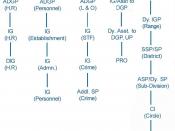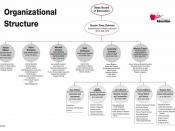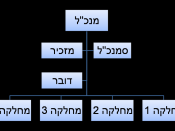Introduction.
"An organization is a consciously coordinated social entity, with a relatively identifiable boundary, that functions on a relatively continuous basis to achieve a common goal or set of goals." (Robbins, 1990 p 4).
Definitions of 'organizations' as advocated by Robbins are by no means in short supply. A cursory glance of any textbook which includes the eye-catching words 'Management' or 'Organization Theory' will paint a similar picture - that of the organization as a 'system' which is functionally effective if it achieves goals formally defined through rational decision-making (Clegg and Hardy, 1999 p 1).
This mainstream, dominant view of organizations and organizational activity is firmly rooted in the functionalist paradigm as it is premised on assumptions concerning the unitary and orderly nature of organizations (Clegg and Handy, 1999 p 1).
Mainstream writers who, more often than not occupy the functionalist paradigm tend to cast organizations as normatively integrated systems, thus ignoring political tensions; and as a holistic entity, thus overlooking organizational sub-units, interest groups and coalitions.
This 'cosy' image that is developed of organizations as cooperative social systems, however, inhibits the development of a political perspective (Bacharach, 1978) and as a consequence, the 'orthodox consensus' (Atkinson, 1971) within management literature adopts an apolitical view of organizations.
Organizations, however are not the rational, harmonious entities that have long been celebrated in managerial theory (Bacharach and Lawler, 1980). Rather, they can be viewed as political systems, as instruments of domination (Morgan, 1997), as arena's in which 'power', 'politics' and 'control' are the games to be played by the organizations' members - in short, organizations can be viewed as 'Evil Empires' (IROB, 2000) - orgainsations conceptualized as arena's of conflicting interests and values constituted through a power struggle.
As Reed points out: "Power remains the most overused and...



Nice job yet
This is a very nice essay... it's very thorough and comprehensive... Good central concept... but i think it should be further developed or built upon a substantial amount into an even better essay... good work!
4 out of 4 people found this comment useful.